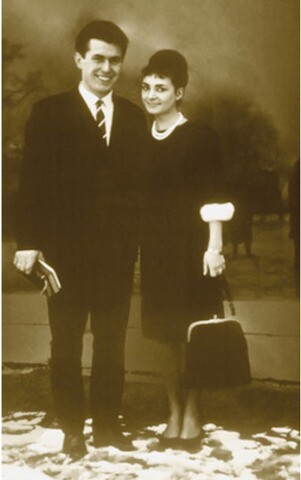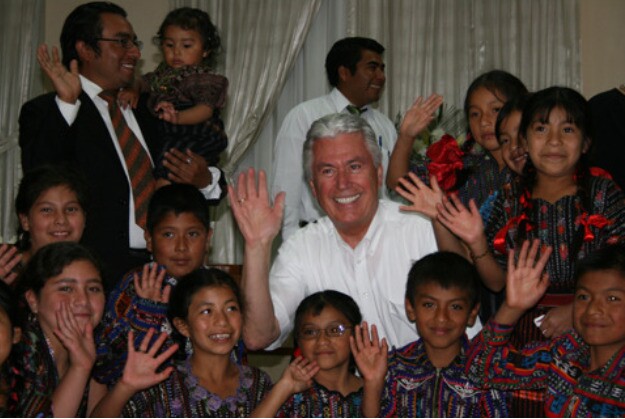Many of the speakers at general conference are natural storytellers. We’re captivated with stories that warn of danger, teach the commandments, and remind us that we are not alone in trials. There seems to be a few, however, that are just pure heart-warming. Elder Uchtdorf in particular always tells the kind of stories that remind you what it felt like to be read a bedtime story as a kid—except these stories are even better because they are based on eternal truth.
In reality, everybody, no matter your age, needs a bedtime story every once in a while. Here are some brief excerpts of our favorite stories from Elder Uchtdorf to soothe, encourage, and help you face the morning.
A Summer with Great-Aunt Rose

“[This] story is about a girl named Eva. There are two important things you should know about Eva. One is that she was 11 years old in this story. And the other is that she absolutely, positively did not want to go and live with her great-aunt Rose. Not at all. No way.
“But Eva’s mother was going to have surgery that required a lengthy recovery. So Eva’s parents were sending her to spend the summer with Great-Aunt Rose.
“In Eva’s mind, there were a thousand reasons why this was a bad idea. For one thing, it would mean being away from her mother. It would also mean leaving her family and friends. And besides, she didn’t even know Great-Aunt Rose. She was quite comfortable, thank you very much, right where she was.
“But no amount of arguing or eye-rolling could change the decision. So Eva packed up a suitcase and took the long drive with her father to Great-Aunt Rose’s house.
“From the moment Eva stepped inside the house, she hated it.
“Everything was so old! Every inch was packed with old books, strange-colored bottles, and plastic bins spilling over with beads, bows, and buttons.
“Great-Aunt Rose lived there alone; she had never married. The only other inhabitant was a gray cat who liked to find the highest point in every room and perch there, staring like a hungry tiger at everything below.
Even the house itself seemed lonely. It was out in the countryside, where the houses are far apart. No one Eva’s age lived within half a mile. That made Eva feel lonely too.
Listen to the rest of Eva’s life-changing summer with Great-Aunt Rose:
The Unsuccessful Waiter
“There is an old story of a waiter who asked a customer whether he had enjoyed the meal. The guest replied that everything was fine, but it would have been better if they had served more bread. The next day, when the man returned, the waiter doubled the amount of bread, giving him four slices instead of two, but still the man was not happy. The next day, the waiter doubled the bread again, without success.
“On the fourth day, the waiter was really determined to make the man happy. And so he took a nine-foot-long (3-m) loaf of bread, cut it in half, and with a smile, served that to the customer. The waiter could scarcely wait for the man’s reaction.
“After the meal, the man looked up and said, “Good as always. But I see you’re back to giving only two slices of bread.”
Listen to Elder Uchtdorf tell the story in “Grateful in Any Circumstances”
The Three Sisters
“A long time ago in a distant land lived a family of three sisters.
“The first sister was sad. Everything from her nose to her chin and from her skin to her toes seemed not quite good enough to her. When she spoke, her words sometimes came out awkwardly, and people laughed. When someone criticized her or “forgot” to invite her to something, she would blush, walk away, and find a secret spot where she would let out a sad sigh and wonder why life had turned out to be so bleak and cheerless.
“The second sister was mad. She thought of herself as very smart, but there was always someone else who scored higher on tests at school. She considered herself funny, fair, fashionable, and fascinating. But always, there seemed to be someone who was funnier, fairer, more fashionable, or more fascinating. She was never first at anything, and this she could not endure. Life was not supposed to be this way!
“Sometimes she lashed out at others, and it seemed that she was always one breath away from being outraged by one thing or another. Of course, this did not make her any more likable or popular. Sometimes she clenched her teeth, tightened her fists, and thought, “Life is so unfair!”
“Then there was the third sister. Unlike her sad and mad sisters, she was—well, glad. And it wasn’t because she was smarter or more beautiful or more capable than her sisters. No, people sometimes avoided or ignored her too. They sometimes made fun of what she was wearing or the things she was saying. They sometimes said mean things about her. But she did not allow any of that to bother her too much.
“This sister loved to sing. She didn’t have great pitch, and people laughed about it, but that didn’t stop her. She would say, “I am not going to let other people and their opinions stop me from singing!”
“The very fact that she kept singing made her first sister sad and her second sister mad.
“Many years passed, and eventually each sister reached the end of her time on earth. The first sister, who discovered again and again that there was no shortage of disappointments in life, eventually died sad. The second, who every day found something new to dislike, died mad. And the third sister, who spent her life singing her song with all her might and a confident smile on her face, died glad.
Of course, life is never so simple, and people are never so one-dimensional as the three sisters in this story. But even extreme examples like these can teach us something about ourselves. If you are like most of us, you may have recognized part of yourself in one, two, or perhaps all three of these sisters. Let us take a closer look at each one.
Let Elder Uchtdorf tell the tale of the three sisters and what we can learn from them.
Bobbie the Wonder Dog
“Nearly a century ago, a family from Oregon was vacationing in Indiana—over 2,000 miles (3,200 km) away—when they lost their beloved dog, Bobbie. The frantic family searched for the dog everywhere but to no avail. Bobbie could not be found.
“Heartbroken, they made the trip home, each mile taking them farther away from their cherished pet.
“Six months later, the family was stunned to find Bobbie on their doorstep in Oregon. “Mangy, scrawny, feet worn to the bone—[he] appeared to have walked the entire distance … by himself.”1 Bobbie’s story captured the imagination of people across the United States, and he became known as Bobbie the Wonder Dog.
“Bobbie is not the only animal who has baffled scientists with an amazing sense of direction and instinct for home. Some monarch butterfly populations migrate 3,000 miles (4,800 km) each year to climes better suited for their survival. Leatherback turtles travel across the Pacific Ocean from Indonesia to the coasts of California. Humpback whales swim from the cold waters of the North and South Poles toward the equator and back. Perhaps even more incredibly, the arctic tern flies from the Arctic Circle to Antarctica and back every year, some 60,000 miles (97,000 km).
“When scientists study this fascinating behavior, they ask questions such as “How do they know where to go?” and “How does each successive generation learn this behavior?” When I read of this powerful instinct in animals, I can’t help but wonder, “Is it possible that human beings have a similar yearning—an inner guidance system, if you will—that draws them to their heavenly home?”
“I believe that every man, woman, and child has felt the call of heaven at some point in his or her life. Deep within us is a longing to somehow reach past the veil and embrace Heavenly Parents we once knew and cherished.
“Some might suppress this yearning and deaden their souls to its call. But those who do not quench this light within themselves can embark on an incredible journey—a wondrous migration toward heavenly climes.
“The sublime message of The Church of Jesus Christ of Latter-day Saints is that God is our Father, that He cares about us, and that there is a way to return to Him. God calls to you. God knows your every thought, your sorrows, and your greatest hopes. God knows the many times you have sought Him. The many times you have felt limitless joy. The many times you have wept in loneliness. The many times you have felt helpless, confused, or angry.
“Yet, no matter your history—if you have faltered, failed, feel broken, bitter, betrayed, or beaten—know that you are not alone. God still calls to you. The Savior extends His hand to you. And, as He did to those fishermen who stood long ago on the banks of the Sea of Galilee, with infinite love He speaks to you: “Come, follow me.” If you will hear Him, He will speak to you this very day.
“When you walk the path of discipleship—when you move toward Heavenly Father—there is something within you that will confirm that you have heard the call of the Savior and set your heart toward the light. It will tell you that you are on the right path and that you are returning home.
Taking a Bike Ride with Her Mother
“One Sunday the missionaries brought a new family to our meetings whom I hadn’t seen before. It was a mother with two beautiful daughters. I thought that these missionaries were doing a very, very good job.
“I particularly took notice of the one daughter with gorgeous dark hair and large brown eyes. Her name was Harriet, and I think I fell in love with her from the first moment I saw her. Unfortunately, this beautiful young woman didn’t seem to feel the same about me. She had many young men who wanted to make her acquaintance, and I began to wonder if she would ever see me as anything but a friend. But I didn’t let that deter me. I figured out ways to be where she was. When I passed the sacrament, I made sure I was in the right position so that I would be the one to pass the sacrament to her.
“When we had special activities at church, I rode my bike to Harriet’s house and rang the doorbell. Harriet’s mother usually answered. In fact, she opened the kitchen window of their apartment on the fourth floor and asked what I wanted. I would ask if Harriet would like a ride to church on my bicycle. Harriet’s mother would say, “No, she will be coming later, but I will be happy to ride with you to church.” This wasn’t exactly what I had in mind, but how could I decline?
“And so we rode to church. I must admit I had a very impressive road bike. Harriet’s mother sat on the top tube bar just in front of me, and I tried to be the most elegant bicycle driver over roads of rough cobblestone.

“Time passed. While beautiful Harriet was seeing many other young men, it seemed that I could not make any headway with her. Was I disappointed? Yes. Was I defeated? Absolutely not! Actually, looking back I recognize that it doesn’t hurt at all to be on good terms with the mother of the girl of your dreams.
“Years later, after I had finished my training as a fighter pilot in the air force, I experienced a modern miracle in Harriet’s response to my continued courting. One day she said, “Dieter, you have matured much over these past years.” I moved quickly after that, and within a few months I was married to the woman I had loved ever since I first saw her. The process hadn’t been easy—there were moments of suffering and despair—but finally my happiness was full, and it still is, even more so.
See Sister Uchtdorf’s sweet reaction during General Conference to her husband sharing their love story.
You Can Do It Now!
“When I was young, falling and getting up seemed to be one and the same motion. Over the years, however, I have come to the unsettling conclusion that the laws of physics have changed—and not to my advantage.
“Not long ago I was skiing with my 12-year-old grandson. We were enjoying our time together when I hit an icy spot and ended up making a glorious crash landing on a steep slope.
“I tried every trick to stand up, but I couldn’t—I had fallen, and I couldn’t get up.
“I felt fine physically, but my ego was a bit bruised. So I made sure that my helmet and goggles were in place, since I much preferred that other skiers not recognize me. I could imagine myself sitting there helplessly as they skied by elegantly, shouting a cheery, “Hello, Brother Uchtdorf!”
“I began to wonder what it would take to rescue me. That was when my grandson came to my side. I told him what had happened, but he didn’t seem very interested in my explanations of why I couldn’t get up. He looked me in the eyes, reached out, took my hand, and in a firm tone said, “Opa, you can do it now!”
“Instantly, I stood.
“I am still shaking my head over this. What had seemed impossible only a moment before immediately became a reality because a 12-year-old boy reached out to me and said, “You can do it now!” To me, it was an infusion of confidence, enthusiasm, and strength.
“Brethren, there may be times in our lives when rising up and continuing on may seem beyond our own ability. That day on a snow-covered slope, I learned something. Even when we think we cannot rise up, there is still hope. And sometimes we just need someone to look us in the eyes, take our hand, and say, “You can do it now!”
Watch Elder Uchtdorf tell this story below:
Feeling Little in Big Spring
“Many years ago I attended pilot training in the United States Air Force. I was far away from my home, a young West German soldier, born in Czechoslovakia, who had grown up in East Germany and spoke English only with great difficulty. I clearly remember my journey to our training base in Texas. I was on a plane, sitting next to a passenger who spoke with a heavy Southern accent. I could scarcely understand a word he said. I actually wondered if I had been taught the wrong language all along. I was terrified by the thought that I had to compete for the coveted top spots in pilot training against students who were native English speakers.
“When I arrived on the air base in the small town of Big Spring, Texas, I looked for and found the Latter-day Saint branch, which consisted of a handful of wonderful members who were meeting in rented rooms on the air base itself. The members were in the process of building a small meetinghouse that would serve as a permanent place for the Church. Back in those days members provided much of the labor on new buildings.
“Day after day I attended my pilot training and studied as hard as I could and then spent most of my spare time working on the new meetinghouse. There I learned that a two-by-four is not a dance step but a piece of wood. I also learned the important survival skill of missing my thumb when pounding a nail.
“I spent so much time working on the meetinghouse that the branch president—who also happened to be one of our flight instructors—expressed concern that I perhaps should spend more time studying.
“My friends and fellow student pilots engaged themselves in free-time activities as well, although I think it’s safe to say that some of those activities would not have been in alignment with today’s For the Strength of Youth pamphlet. For my part, I enjoyed being an active part of this tiny west Texas branch, practicing my newly acquired carpentry skills, and improving my English as I fulfilled my callings to teach in the elders quorum and in Sunday School.
“At the time, Big Spring, despite its name, was a small, insignificant, and unknown place. And I often felt exactly the same way about myself—insignificant, unknown, and quite alone. Even so, I never once wondered if the Lord had forgotten me or if He would ever be able to find me there. I knew that it didn’t matter to Heavenly Father where I was, where I ranked with others in my pilot training class, or what my calling in the Church was. What mattered to Him was that I was doing the best I could, that my heart was inclined toward Him, and that I was willing to help those around me. I knew if I did the best I could, all would be well. And all was well.
““The Lord doesn’t care at all if we spend our days working in marble halls or stable stalls. He knows where we are, no matter how humble our circumstances. He will use—in His own way and for His holy purposes—those who incline their hearts to Him.
God knows that some of the greatest souls who have ever lived are those who will never appear in the chronicles of history. They are the blessed, humble souls who emulate the Savior’s example and spend the days of their lives doing good.
Listen to Elder Uchtdorf tell the story and give more examples of blessed, humble souls doing good.





